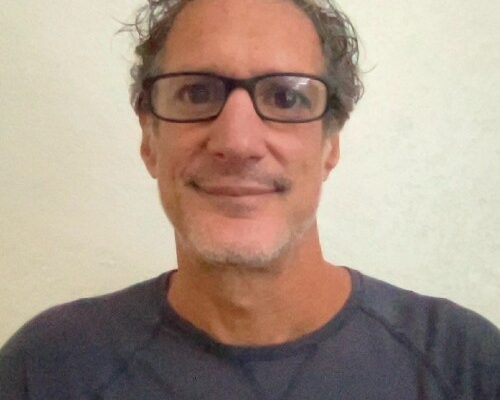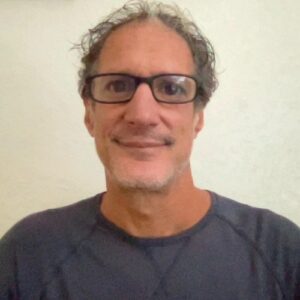
Jay Cohen
April 2021
 Jay Cohen is a science teacher at Martin Luther King Junior Middle School, where he has shared his passion for creativity in STEM learning for over 20 years.
Jay Cohen is a science teacher at Martin Luther King Junior Middle School, where he has shared his passion for creativity in STEM learning for over 20 years.
What led you to become a teacher?
It was getting a chance to work with kids in a volunteer program that got me into it. I was set up to be a lawyer, studying at Vermont Law. I heard about an opportunity to work with fourth graders: taking them outside, going on adventures and doing ecological activities with them. I worked a couple hours with them and knew that was my calling. It never felt right being in a law library, it felt lonely. I knew I was doing good work, but I wanted to be interacting. I saw the potential for excitement working with kids. I took a year leave of absence to work with kids and never looked back. I went from environmental law to environmental education and that morphed into classroom teaching.
Who do you hope to inspire in your work?
Some of my students will go on to be scientists and that’s awesome. I want to give all the kids the gift of learning about the world around us, of getting excited about learning, of following a system and being successful.
Kids of all ages enjoy choice. I try to encourage and create lessons where the kids have choice, then they have an emotional buy-in. Anytime I can get an emotional buy-in, the academics will follow next. If they get a new skateboard, [they] don’t take classes. They’re excited about learning how to get on that skateboard, and it’s an emotional experience. The balance comes next. But if they’re not happy to get on the board, they’re not going to want to do it. I try to give them opportunities to convert that emotional excitement into academic success. Any activity that allows the students to be themselves helps that.
When do you experience wonder in your work?
Everyday I experience wonder and I try to pass on that excitement about the natural world to my students. The natural world inspires me, this time of year I’m constantly amazed by flowers. I use the natural world to inspire my students, other kids I talk about baseball or basketball. To me, the chance to see nature in action keeps me going. I want my grandchildren and great-grandchildren to have as beautiful a world as I have and I feel teaching the next generation about it is one good way of that happening.
Anytime I can get the kids out of the classroom I feel like magic happens. I try to get my students out as much as possible. We have a garden program at our school and I give them a lot opportunity to be in nature. I’d rather err on the side of no structure, no pencil, getting outside. [The teachers] take the kids to the tide pools, and some kids have never been to a beach before, let alone tide pools. I see kids touching a sea anemone for the first time, getting their feet wet and laughing, feeling the seaweed, holding a crab for the first time. It’s been wonderful. As much as I enjoy teaching in the classroom, for me that’s just the stepping stone to get them outside.
Describe a discovery you’ve made.
I discovered early on that kids really do have a natural curiosity. Kids want to learn, they get a bit of a bad rep that they’re in school and they don’t want to be there. They may not want to be at school following the rules, but they do want to learn. Even my students who hate school, they don’t hate learning. I learned that with my own kids learning how to pick up a fork for the first time, it’s super exciting! And my twelve year olds are picking up a beaker for the first time. I see their innate curiosity. We wouldn’t be here as a species if we didn’t have a sense of wonderment and want to explore. I give them the space to do what their bodies and millions of years of evolution have been telling them to do: explore the world, figure it out, learn, take that information, carry it on. I never feel like I have to force kids to learn, I have to find the key to open up their door that’s already there.
Describe a goal you have.
I try to have them learn from doing as much as possible, even if it gets a little messy. I think of it as getting on a bike, if you’re scared to fall off the bike or the skateboard the first time you’re on it, you’re not gonna do as well. I even tell the kids, “That’s okay, you got your knees skinned up a little bit. We learn from this experience.” Making failure a part of it is a part of how I do that. In my class, we honor the messiness of learning and that we don’t always know what we’re going to learn but by creating a good environment, there will be learning.